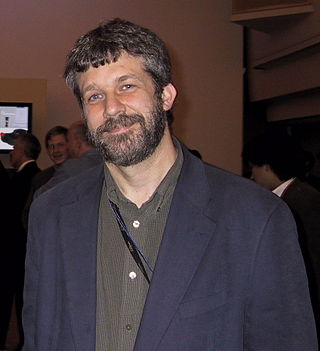Related Research Articles

Computing is any goal-oriented activity requiring, benefiting from, or creating computing machinery. It includes the study and experimentation of algorithmic processes, and the development of both hardware and software. Computing has scientific, engineering, mathematical, technological, and social aspects. Major computing disciplines include computer engineering, computer science, cybersecurity, data science, information systems, information technology, and software engineering.
Grid computing is the use of widely distributed computer resources to reach a common goal. A computing grid can be thought of as a distributed system with non-interactive workloads that involve many files. Grid computing is distinguished from conventional high-performance computing systems such as cluster computing in that grid computers have each node set to perform a different task/application. Grid computers also tend to be more heterogeneous and geographically dispersed than cluster computers. Although a single grid can be dedicated to a particular application, commonly a grid is used for a variety of purposes. Grids are often constructed with general-purpose grid middleware software libraries. Grid sizes can be quite large.
Computer science is the study of the theoretical foundations of information and computation and their implementation and application in computer systems. One well known subject classification system for computer science is the ACM Computing Classification System devised by the Association for Computing Machinery.
Theoretical computer science is a subfield of computer science and mathematics that focuses on the abstract and mathematical foundations of computation.
Bio-inspired computing, short for biologically inspired computing, is a field of study which seeks to solve computer science problems using models of biology. It relates to connectionism, social behavior, and emergence. Within computer science, bio-inspired computing relates to artificial intelligence and machine learning. Bio-inspired computing is a major subset of natural computation.
Social computing is an area of computer science that is concerned with the intersection of social behavior and computational systems. It is based on creating or recreating social conventions and social contexts through the use of software and technology. Thus, blogs, email, instant messaging, social network services, wikis, social bookmarking and other instances of what is often called social software illustrate ideas from social computing.
Human-centered computing (HCC) studies the design, development, and deployment of mixed-initiative human-computer systems. It is emerged from the convergence of multiple disciplines that are concerned both with understanding human beings and with the design of computational artifacts. Human-centered computing is closely related to human-computer interaction and information science. Human-centered computing is usually concerned with systems and practices of technology use while human-computer interaction is more focused on ergonomics and the usability of computing artifacts and information science is focused on practices surrounding the collection, manipulation, and use of information.
Grid MP is a commercial distributed computing software package developed and sold by Univa, a privately held company based primarily in Austin, Texas. It was formerly known as the MetaProcessor prior to the release of version 4.0, however the letters MP in Grid MP do not officially stand for anything.
Model-driven engineering (MDE) is a software development methodology that focuses on creating and exploiting domain models, which are conceptual models of all the topics related to a specific problem. Hence, it highlights and aims at abstract representations of the knowledge and activities that govern a particular application domain, rather than the computing concepts.

Charlie Catlett is a senior computer scientist at Argonne National Laboratory and a visiting senior fellow at the Mansueto Institute for Urban Innovation at the University of Chicago. From 2020 to 2022 he was a senior research scientist at the University of Illinois Discovery Partners Institute. He was previously a senior computer scientist at Argonne National Laboratory and a senior fellow in the Computation Institute, a joint institute of Argonne National Laboratory and The University of Chicago, and a senior fellow at the University of Chicago's Harris School of Public Policy.
The following outline is provided as an overview of and topical guide to computer programming:
The Sidney Fernbach Award established in 1992 by the IEEE Computer Society, in memory of Sidney Fernbach, one of the pioneers in the development and application of high performance computers for the solution of large computational problems as the Division Chief for the Computation Division at Lawrence Livermore Laboratory from the late 1950s through the 1970s. A certificate and $2,000 are awarded for outstanding contributions in the application of high performance computers using innovative approaches. The nomination deadline is 1 July each year.

Róbert Lovas is a Hungarian computer scientist at SZTAKI, Budapest, Hungary.
Polish Grid Infrastructure PL-Grid, a nationwide computing structure, built in 2009-2011, under the scientific project PL-Grid – Polish Infrastructure for Supporting Computational Science in the European Research Space. Its purpose was to enable scientific research based on advanced computer simulations and large-scale computations using the computer clusters, and to provide convenient access to the computer resources for research teams, also outside the communities, in which the high performance computing centers operate.
The service-oriented computing environment (SORCER) is a distributed computing platform implemented in Java. It allows writing network-programs that operate on wrapped applications (services) to spread across the network. SORCER is often utilized in scenarios similar to those where grids are used in order to run parallel tasks.
This glossary of computer science is a list of definitions of terms and concepts used in computer science, its sub-disciplines, and related fields, including terms relevant to software, data science, and computer programming.
References
- ↑ Smarr, Larry; Catlett, Charles E. (1992). "Metacomputing". Communications of the ACM. 35 (6): 44. doi: 10.1145/129888.129890 .